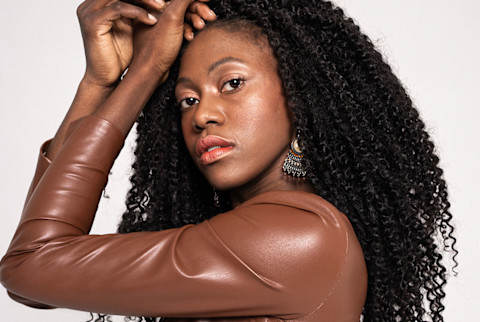Skin Care Superstar Ingredient Phytoceramides Can Also Improve Hair Fullness & Growth, Says New Research

There is no shortage of hair growth supplements on the market—from powders and pills to tonics and gummies, countless products tout the promise of full, thick hair with regular use. But how trustworthy are those claims?
While I wish I could give you a clear-cut answer, the truth is that it’s complicated.
However, new research indicates that a surprising ingredient may ultimately support scalp health and hair retention. Here’s what we know.
Do hair growth supplements really work? What we know from research:
Hair growth and health are influenced by many factors—both internal and external. So, identifying a singular treatment for hair loss (like via a magical supplement) is usually not that straightforward.
That being said, hair supplements can play an important role in a larger holistic routine designed for overall hair health.
Here’s how:
- Most hair supplements work by providing internal structural support to the scalp, hair follicle, and fiber.
- For example Hair is made up of keratin1, a type of protein that consists of about 18 amino acids2 including cysteine, proline, threonine, leucine, and arginine. This can be supported by supplementing with proteins and amino acids.
- And like most processes in the body, the production of keratin is heavily influenced by free radical damage and oxidative stress—both of which can be eased or neutralized by antioxidants.
- Finally, scalp health is vital for optimal hair growth, so utilizing skin-supporting ingredients like fatty acids and lipids can mean the scalp is less irritated and retains hair follicles.
While the research has come a long way in recent years, there’s still not a ton of research done to lean on.
For example, clinical studies using supplements in healthy populations are harder to find. (You'll find some research in people with various nutrient deficiencies, but there's not much published research on hair supplements for the average person.)
That’s why when new research is published showing that specific nutrients can have healthy hair benefits, we get excited.
Including a new randomized, double-blind, placebo-controlled clinical study just published in the International Journal of Cosmetics about phytoceramides and hair loss reduction.
How phytoceramides can help hair density
This pilot clinical study aimed at exploring the efficacy of a wheat polar lipid complex (WPLC, Ceramosides™) on hair characteristics improvement, such as density and reduced shedding.
The study included 66 women—including 10 postmenopausal women—who were experiencing acute shedding.
What are phytoceramides?
The researchers were able to measure the hair loss by evaluating what percentage of the participants’ hair was in the “shedding” phase, called telogen phase.
For this study, they selected participants who had at least 15% of their hair in the telogen phase. The participants were then split into two groups: One who consumed the lipid complex and one who received a placebo.
Hair growth phases:
The participants' hair was assessed after 56 and 84 days. The researchers looked at a variety of metrics including the percentage of hair that was in the anagen or telogen phase, hair shedding susceptibility via the hair pull test, hair diameter and length at breakpoint, sebum production, and finally, hair growth.
Here’s what they found:
- Participants who took the phytoceramide supplement had a reduced percentage of hair in the telogen phase and an increased percentage in the anagen phase compared to the placebo. This was seen at the 56 day mark, but had the most significant results at 84 days.
- While both groups had reduced hair shedding via the hair pull test at day 56, by day 84 the supplement group saw reduced shedding.
- Hair diameter and length at breakpoint was measured at day 84, and the supplementation group saw a slight improvement in hair diameter and elongation.
- The supplementation group saw reduced sebum production, but it was not statistically significant.
- Most notably, supplementation improved hair growth at the 84 day mark compared to the placebo group.
The takeaway
Certainly more research is needed to help us understand the role of supplementation in hair growth and health—but this clinical trial adds to the growing library of science that helps us understand what nutrients can help us maintain healthy, thick hair.
